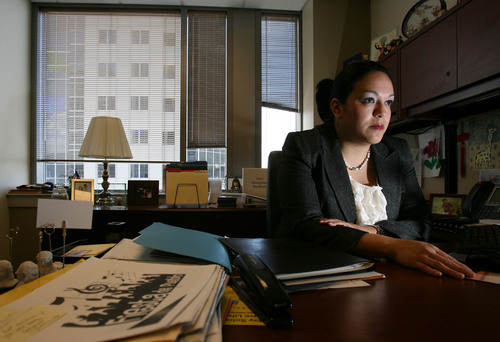This is an archived article that was published on sltrib.com in 2013, and information in the article may be outdated. It is provided only for personal research purposes and may not be reprinted.
Some people refer to Utah as a theocracy, run by The Church of Jesus Christ of Latter-day Saints. Utah's poor record of women in higher education, business and government has even drawn comparisons to Taliban-run Afghanistan. Neither is accurate, of course, but the church's influence, not only over its members but Utah culture in general, can't be overlooked.
Some of the Utah statistics reported by the Center for American Progress in its "The State of Women in America" report must be examined through the lens of LDS Church doctrine on the role of women in the family and society. The model of dad as breadwinner and mom as homemaker is, indeed, ingrained.
Utah received an F grade in the report and is ranked 49th among the states. Only Louisiana ranked lower in the analysis of data on such topics as poverty, health, the gender wage gap, and women's participation in government and business.
The data is not new; all these issues have been raised one at a time. But the aggregate picture shown in this report is startling and alarming. Or it should be.
For example, 57.6 percent of Utah workers earning $10 an hour or less are women. While Utah women's participation in the workforce is near the national average, only 31.8 percent of management jobs are held by women, the third-lowest percentage among the states.
Utah's divorce rate is about the national average, but single mothers and divorced women — the same as all Utah working women — take home only about 70 cents for every dollar a Utah man earns, the fourth-worst gap in the nation.
The difference between the percentage of Utah women and men with college degrees is the largest in the nation.
At least some of the blame for these statistics must be laid at the feet of Utahns who encourage their daughters to marry and have children at a young age, an admonition that directly translates into women leaving college before they have a degree and seeking jobs with less responsibility that also pay less.
As a result, women-headed households and households with only one working spouse tend to score low on economic security, a criterion in which Utah ranked 43rd.
In another troubling category, the state landed at 50th on leadership. Utah is one of just five states that have no women holding statewide office or a seat in Congress. Just 16.3 percent of Utah legislators are women.
In limiting the accepted roles for women, Utah, like some Third World countries, undervalues the potential contributions of half its people. That's counterproductive and unacceptable.



